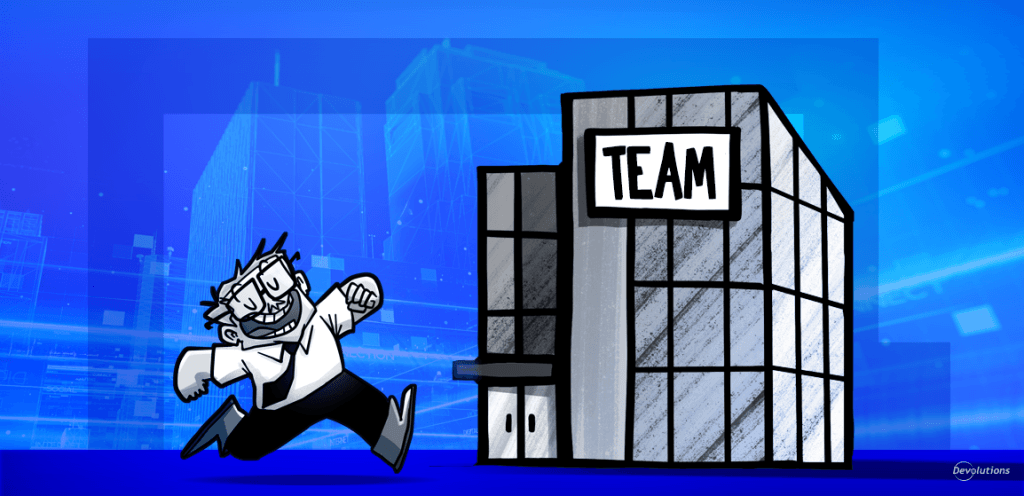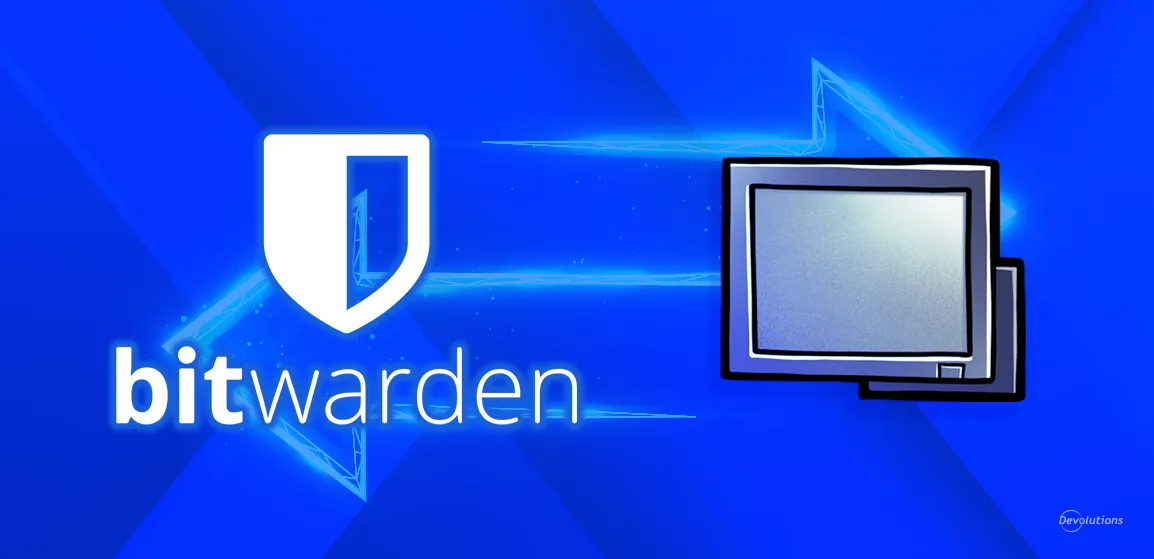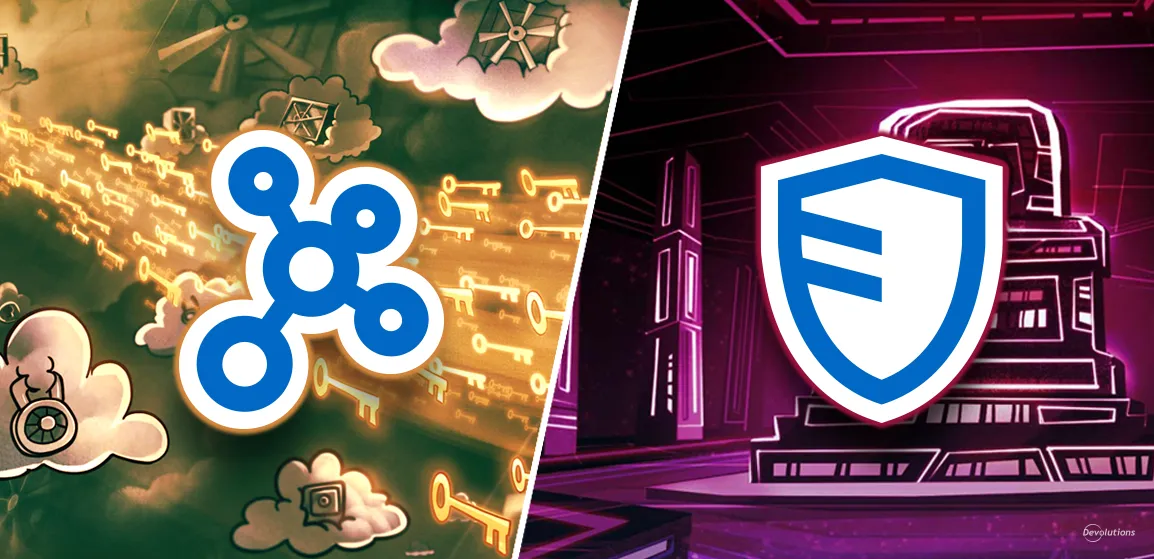This article highlights the top six reasons to consider upgrading to the Team edition of Remote Desktop Manager (RDM), illustrated through the experiences of two fictitious characters, Maurice and Kelly.
A more detailed comparison of editions is available here.
1. Team database for centralized, cross-platform data sharing
Remote Desktop Manager Team supports various advanced data sources, such as SQL Server, Azure SQL, Devolutions Hub, and Devolutions Server. When an admin sets up a connection, changes a password, adds an attachment, or manages entries, these actions are automatically synced across all user copies of RDM, significantly reducing errors and improving efficiency. Available for Windows, macOS, and Linux, RDM supports all major desktop operating systems as well as iOS and Android for mobile in-the-field support.
Maurice, a quintessential sysadmin, experienced this feature firsthand when he transitioned his team to RDM Team. Previously, everyone had their credentials saved in disparate locations, causing chaos and inefficiency. By centralizing connections and credentials, Maurice not only streamlined operations but also facilitated the onboarding process for new employees like junior-level help desk specialist Kelly, ensuring she had immediate access to the connections she needed from day one. The cross-platform availability of RDM Team meant that Kelly could access these connections seamlessly whether she was in the office on her Windows desktop or in the field using her Android tablet.
2. Third-party password manager integrations
Users who rely on password managers like KeePass, LastPass, 1Password, and others can integrate their existing solution with RDM Team and continue using these tools within a secure, centralized platform.
No password manager? No problem. RDM Team offers robust, built-in password management tools, providing a convenient and secure way to handle passwords directly within the platform.
For Maurice, integrating KeePass as a third-party password manager was a seamless transition when migrating fully to RDM Team. This integration allowed the team to maintain access to their old KeePass database, ensuring that everyone could continue their work uninterrupted.
3. Advanced security management
RDM Team features a comprehensive and powerful interface for managing user security rights. After creating profiles for either custom or domain users, administrators can partially or completely restrict access to specific sessions or subsets assigned to a user group. Furthermore, RDM Team can be combined with Devolutions Server to ensure the highest level of security and encryption.
When Kelly joined the team, Maurice used permission sets to define custom roles and combined them with DVLS groups to tailor Kelly's access to exactly what she needed. This gradual approach not only ensured security but also helped Kelly acclimate to her new role without feeling overwhelmed.
4. Centralized logs and audit trails
RDM Team automatically keeps track of actions performed on entries in the database (e.g. editing, deleting, opening/closing). This allows administrators to monitor, verify, and analyze the time spent by each user on a specific client or particular machine.
When audit time came around, Maurice found this feature invaluable. Instead of painstakingly combing through server logs, he rapidly generated comprehensive reports for the auditors, showcasing every action and connection used by the team. This not only saved time but also demonstrated the team's efficiency and compliance.
5. Session recording
RDM Team offers built-in capabilities for recording several connection protocols like RDP, SSH, VNC, ARD, SFTP, web sessions, and more.
Maurice used the session recording tool extensively for training purposes. When Kelly was learning her new roles on the server team, Maurice recorded the sessions to create a training library. This not only allowed Kelly to revisit the sessions for better understanding but also enabled her to document the processes. These recordings became an essential resource for future new employees, easing their training process and ensuring consistency.
6. Secure remote endpoint access control
Restricting RDP access and other connection protocols requires several policies and security mechanisms. With RDM Team edition, admins can deploy Devolutions Gateway, an excellent alternative to VPNs and Remote Desktop Gateway, to effectively control and bar unauthorized users from circumventing security measures.
This feature proved to be a game-changer for Maurice when he needed to work from home for a week. With the Gateway integration, he easily connected to his endpoints without the hassle of setting up a VPN, avoiding performance bottlenecks and maintaining security.
Conclusion
Upgrading from Remote Desktop Manager Free to the Team edition provides a significant boost in functionality, security, and productivity. The advanced features of the Team edition are designed to meet the complex needs of modern IT environments, whether you are managing connections with a small team, or you’re an MSP with dozens of clients. Make the switch and experience the full power of Remote Desktop Manager. Get started with a free 30-day trial!
About Remote Desktop Manager
Remote Desktop Manager (RDM) is the leading network management tool for centralizing remote connection technologies, machine data, password management, and access controls on a single, secure, scalable, and simple-to-use platform. While the Free edition provides a robust set of features for solo IT technicians, the Team edition unlocks a more powerful suite of tools that are indispensable in team environments.





